Case Study: Alibaba's Organisational Culture, CSR, and Global Strategy
VerifiedAdded on 2023/03/31
|6
|1259
|170
Case Study
AI Summary
This case study examines Alibaba's organizational culture and corporate social responsibility (CSR) initiatives in both China and the UK, highlighting the cultural differences impacting business negotiations and CSR priorities. The analysis reveals contrasting approaches, with China emphasizing long-term relationships and broader social responsibility, while the UK focuses on efficiency and legal compliance. Recommendations include adopting international compliance laws and transactional leadership, finding suitable international partners to foster cohesive multicultural teams and improve business performance. The study concludes that understanding and adapting to cultural nuances and CSR expectations are crucial for Alibaba's global success. Desklib offers a wealth of similar case studies and solved assignments to aid student learning.
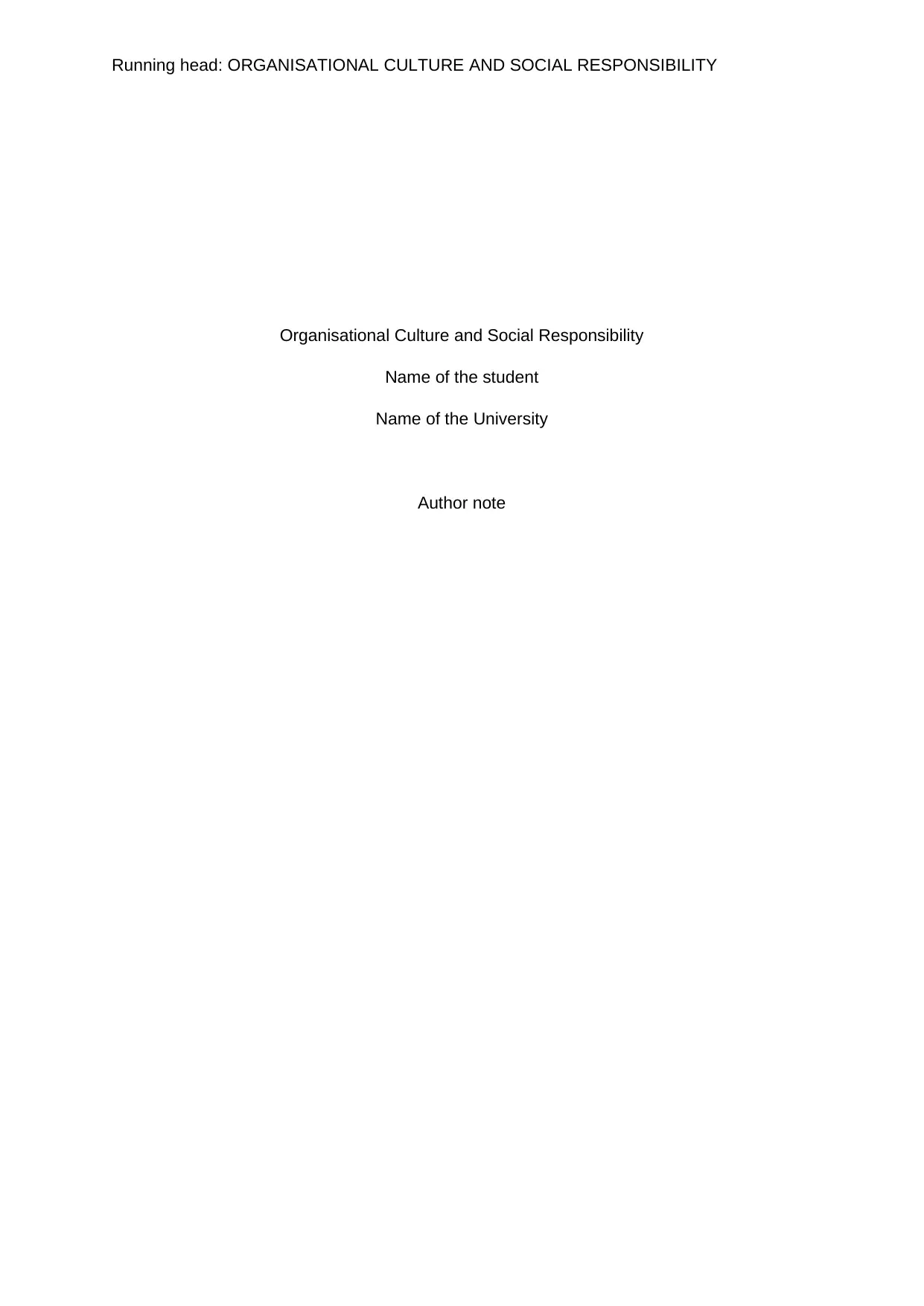
Running head: ORGANISATIONAL CULTURE AND SOCIAL RESPONSIBILITY
Organisational Culture and Social Responsibility
Name of the student
Name of the University
Author note
Organisational Culture and Social Responsibility
Name of the student
Name of the University
Author note
Paraphrase This Document
Need a fresh take? Get an instant paraphrase of this document with our AI Paraphraser

1ORGANISATIONAL CULTURE AND SOCIAL RESPONSIBILITY
Table of Contents
Introduction............................................................................................................................ 3
Organisational culture of Alibaba............................................................................................3
Corporate Social Responsibility of Alibaba.............................................................................3
Recommendations................................................................................................................. 4
Conclusion............................................................................................................................. 5
References............................................................................................................................. 6
Table of Contents
Introduction............................................................................................................................ 3
Organisational culture of Alibaba............................................................................................3
Corporate Social Responsibility of Alibaba.............................................................................3
Recommendations................................................................................................................. 4
Conclusion............................................................................................................................. 5
References............................................................................................................................. 6
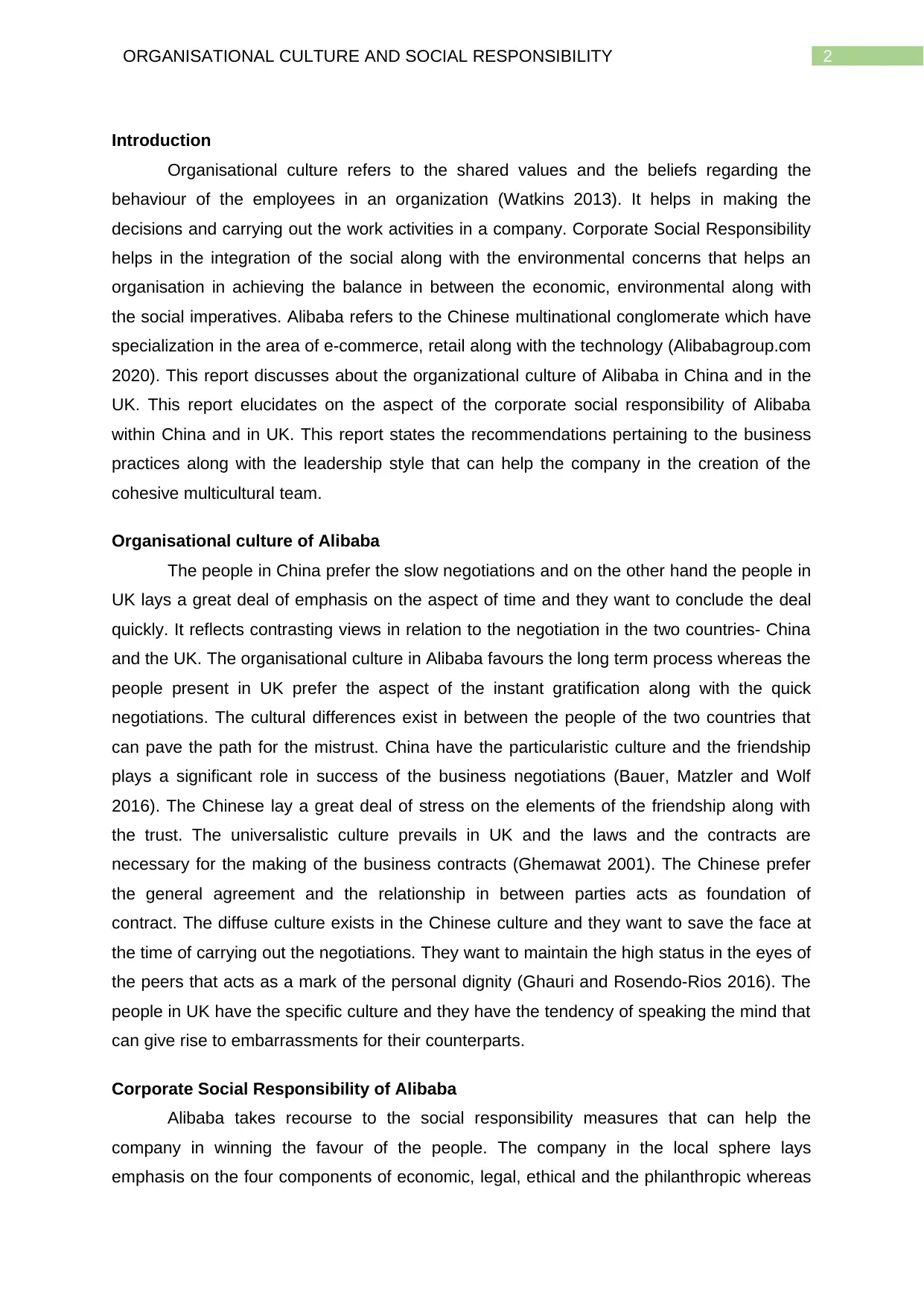
2ORGANISATIONAL CULTURE AND SOCIAL RESPONSIBILITY
Introduction
Organisational culture refers to the shared values and the beliefs regarding the
behaviour of the employees in an organization (Watkins 2013). It helps in making the
decisions and carrying out the work activities in a company. Corporate Social Responsibility
helps in the integration of the social along with the environmental concerns that helps an
organisation in achieving the balance in between the economic, environmental along with
the social imperatives. Alibaba refers to the Chinese multinational conglomerate which have
specialization in the area of e-commerce, retail along with the technology (Alibabagroup.com
2020). This report discusses about the organizational culture of Alibaba in China and in the
UK. This report elucidates on the aspect of the corporate social responsibility of Alibaba
within China and in UK. This report states the recommendations pertaining to the business
practices along with the leadership style that can help the company in the creation of the
cohesive multicultural team.
Organisational culture of Alibaba
The people in China prefer the slow negotiations and on the other hand the people in
UK lays a great deal of emphasis on the aspect of time and they want to conclude the deal
quickly. It reflects contrasting views in relation to the negotiation in the two countries- China
and the UK. The organisational culture in Alibaba favours the long term process whereas the
people present in UK prefer the aspect of the instant gratification along with the quick
negotiations. The cultural differences exist in between the people of the two countries that
can pave the path for the mistrust. China have the particularistic culture and the friendship
plays a significant role in success of the business negotiations (Bauer, Matzler and Wolf
2016). The Chinese lay a great deal of stress on the elements of the friendship along with
the trust. The universalistic culture prevails in UK and the laws and the contracts are
necessary for the making of the business contracts (Ghemawat 2001). The Chinese prefer
the general agreement and the relationship in between parties acts as foundation of
contract. The diffuse culture exists in the Chinese culture and they want to save the face at
the time of carrying out the negotiations. They want to maintain the high status in the eyes of
the peers that acts as a mark of the personal dignity (Ghauri and Rosendo-Rios 2016). The
people in UK have the specific culture and they have the tendency of speaking the mind that
can give rise to embarrassments for their counterparts.
Corporate Social Responsibility of Alibaba
Alibaba takes recourse to the social responsibility measures that can help the
company in winning the favour of the people. The company in the local sphere lays
emphasis on the four components of economic, legal, ethical and the philanthropic whereas
Introduction
Organisational culture refers to the shared values and the beliefs regarding the
behaviour of the employees in an organization (Watkins 2013). It helps in making the
decisions and carrying out the work activities in a company. Corporate Social Responsibility
helps in the integration of the social along with the environmental concerns that helps an
organisation in achieving the balance in between the economic, environmental along with
the social imperatives. Alibaba refers to the Chinese multinational conglomerate which have
specialization in the area of e-commerce, retail along with the technology (Alibabagroup.com
2020). This report discusses about the organizational culture of Alibaba in China and in the
UK. This report elucidates on the aspect of the corporate social responsibility of Alibaba
within China and in UK. This report states the recommendations pertaining to the business
practices along with the leadership style that can help the company in the creation of the
cohesive multicultural team.
Organisational culture of Alibaba
The people in China prefer the slow negotiations and on the other hand the people in
UK lays a great deal of emphasis on the aspect of time and they want to conclude the deal
quickly. It reflects contrasting views in relation to the negotiation in the two countries- China
and the UK. The organisational culture in Alibaba favours the long term process whereas the
people present in UK prefer the aspect of the instant gratification along with the quick
negotiations. The cultural differences exist in between the people of the two countries that
can pave the path for the mistrust. China have the particularistic culture and the friendship
plays a significant role in success of the business negotiations (Bauer, Matzler and Wolf
2016). The Chinese lay a great deal of stress on the elements of the friendship along with
the trust. The universalistic culture prevails in UK and the laws and the contracts are
necessary for the making of the business contracts (Ghemawat 2001). The Chinese prefer
the general agreement and the relationship in between parties acts as foundation of
contract. The diffuse culture exists in the Chinese culture and they want to save the face at
the time of carrying out the negotiations. They want to maintain the high status in the eyes of
the peers that acts as a mark of the personal dignity (Ghauri and Rosendo-Rios 2016). The
people in UK have the specific culture and they have the tendency of speaking the mind that
can give rise to embarrassments for their counterparts.
Corporate Social Responsibility of Alibaba
Alibaba takes recourse to the social responsibility measures that can help the
company in winning the favour of the people. The company in the local sphere lays
emphasis on the four components of economic, legal, ethical and the philanthropic whereas
⊘ This is a preview!⊘
Do you want full access?
Subscribe today to unlock all pages.

Trusted by 1+ million students worldwide
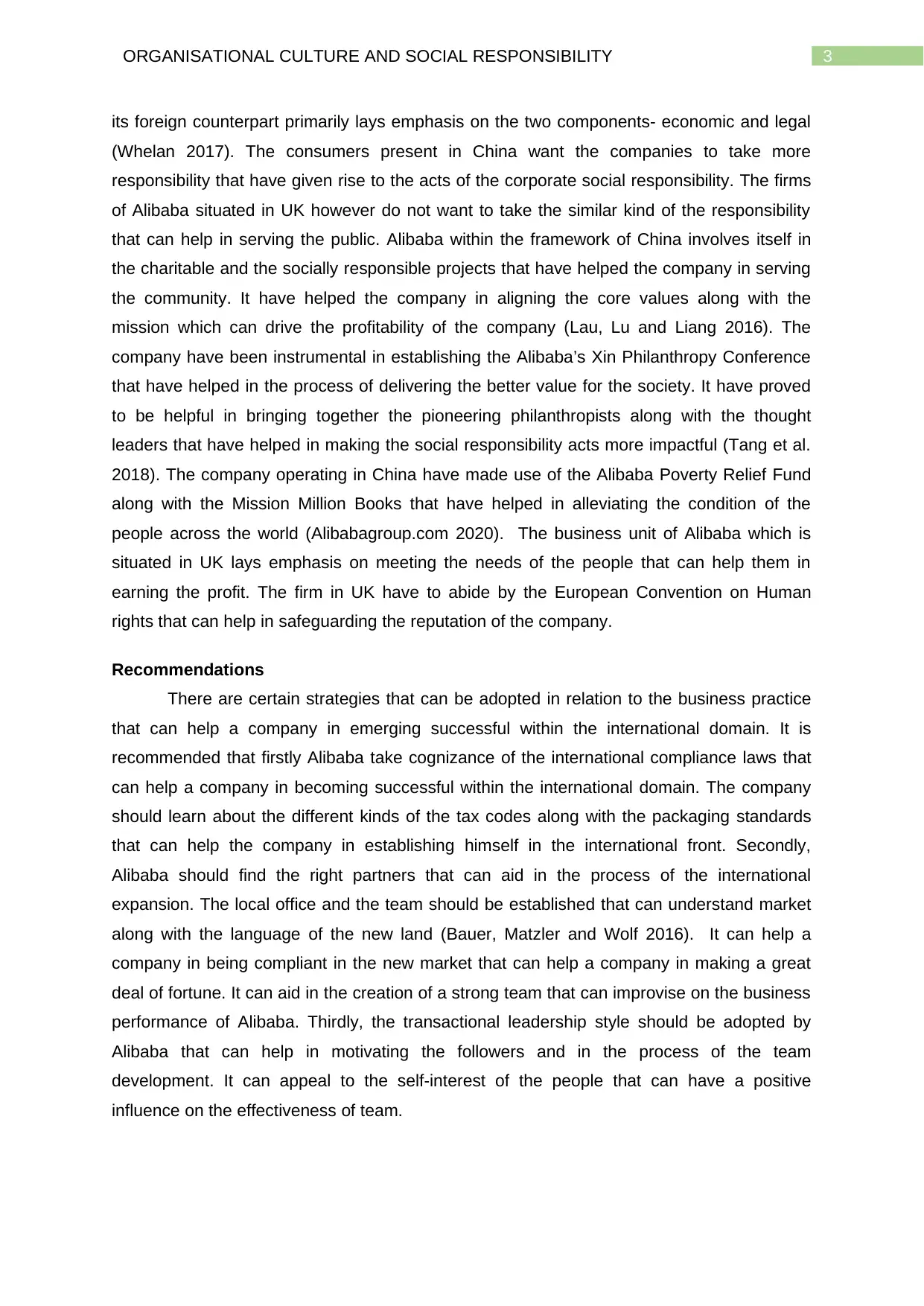
3ORGANISATIONAL CULTURE AND SOCIAL RESPONSIBILITY
its foreign counterpart primarily lays emphasis on the two components- economic and legal
(Whelan 2017). The consumers present in China want the companies to take more
responsibility that have given rise to the acts of the corporate social responsibility. The firms
of Alibaba situated in UK however do not want to take the similar kind of the responsibility
that can help in serving the public. Alibaba within the framework of China involves itself in
the charitable and the socially responsible projects that have helped the company in serving
the community. It have helped the company in aligning the core values along with the
mission which can drive the profitability of the company (Lau, Lu and Liang 2016). The
company have been instrumental in establishing the Alibaba’s Xin Philanthropy Conference
that have helped in the process of delivering the better value for the society. It have proved
to be helpful in bringing together the pioneering philanthropists along with the thought
leaders that have helped in making the social responsibility acts more impactful (Tang et al.
2018). The company operating in China have made use of the Alibaba Poverty Relief Fund
along with the Mission Million Books that have helped in alleviating the condition of the
people across the world (Alibabagroup.com 2020). The business unit of Alibaba which is
situated in UK lays emphasis on meeting the needs of the people that can help them in
earning the profit. The firm in UK have to abide by the European Convention on Human
rights that can help in safeguarding the reputation of the company.
Recommendations
There are certain strategies that can be adopted in relation to the business practice
that can help a company in emerging successful within the international domain. It is
recommended that firstly Alibaba take cognizance of the international compliance laws that
can help a company in becoming successful within the international domain. The company
should learn about the different kinds of the tax codes along with the packaging standards
that can help the company in establishing himself in the international front. Secondly,
Alibaba should find the right partners that can aid in the process of the international
expansion. The local office and the team should be established that can understand market
along with the language of the new land (Bauer, Matzler and Wolf 2016). It can help a
company in being compliant in the new market that can help a company in making a great
deal of fortune. It can aid in the creation of a strong team that can improvise on the business
performance of Alibaba. Thirdly, the transactional leadership style should be adopted by
Alibaba that can help in motivating the followers and in the process of the team
development. It can appeal to the self-interest of the people that can have a positive
influence on the effectiveness of team.
its foreign counterpart primarily lays emphasis on the two components- economic and legal
(Whelan 2017). The consumers present in China want the companies to take more
responsibility that have given rise to the acts of the corporate social responsibility. The firms
of Alibaba situated in UK however do not want to take the similar kind of the responsibility
that can help in serving the public. Alibaba within the framework of China involves itself in
the charitable and the socially responsible projects that have helped the company in serving
the community. It have helped the company in aligning the core values along with the
mission which can drive the profitability of the company (Lau, Lu and Liang 2016). The
company have been instrumental in establishing the Alibaba’s Xin Philanthropy Conference
that have helped in the process of delivering the better value for the society. It have proved
to be helpful in bringing together the pioneering philanthropists along with the thought
leaders that have helped in making the social responsibility acts more impactful (Tang et al.
2018). The company operating in China have made use of the Alibaba Poverty Relief Fund
along with the Mission Million Books that have helped in alleviating the condition of the
people across the world (Alibabagroup.com 2020). The business unit of Alibaba which is
situated in UK lays emphasis on meeting the needs of the people that can help them in
earning the profit. The firm in UK have to abide by the European Convention on Human
rights that can help in safeguarding the reputation of the company.
Recommendations
There are certain strategies that can be adopted in relation to the business practice
that can help a company in emerging successful within the international domain. It is
recommended that firstly Alibaba take cognizance of the international compliance laws that
can help a company in becoming successful within the international domain. The company
should learn about the different kinds of the tax codes along with the packaging standards
that can help the company in establishing himself in the international front. Secondly,
Alibaba should find the right partners that can aid in the process of the international
expansion. The local office and the team should be established that can understand market
along with the language of the new land (Bauer, Matzler and Wolf 2016). It can help a
company in being compliant in the new market that can help a company in making a great
deal of fortune. It can aid in the creation of a strong team that can improvise on the business
performance of Alibaba. Thirdly, the transactional leadership style should be adopted by
Alibaba that can help in motivating the followers and in the process of the team
development. It can appeal to the self-interest of the people that can have a positive
influence on the effectiveness of team.
Paraphrase This Document
Need a fresh take? Get an instant paraphrase of this document with our AI Paraphraser
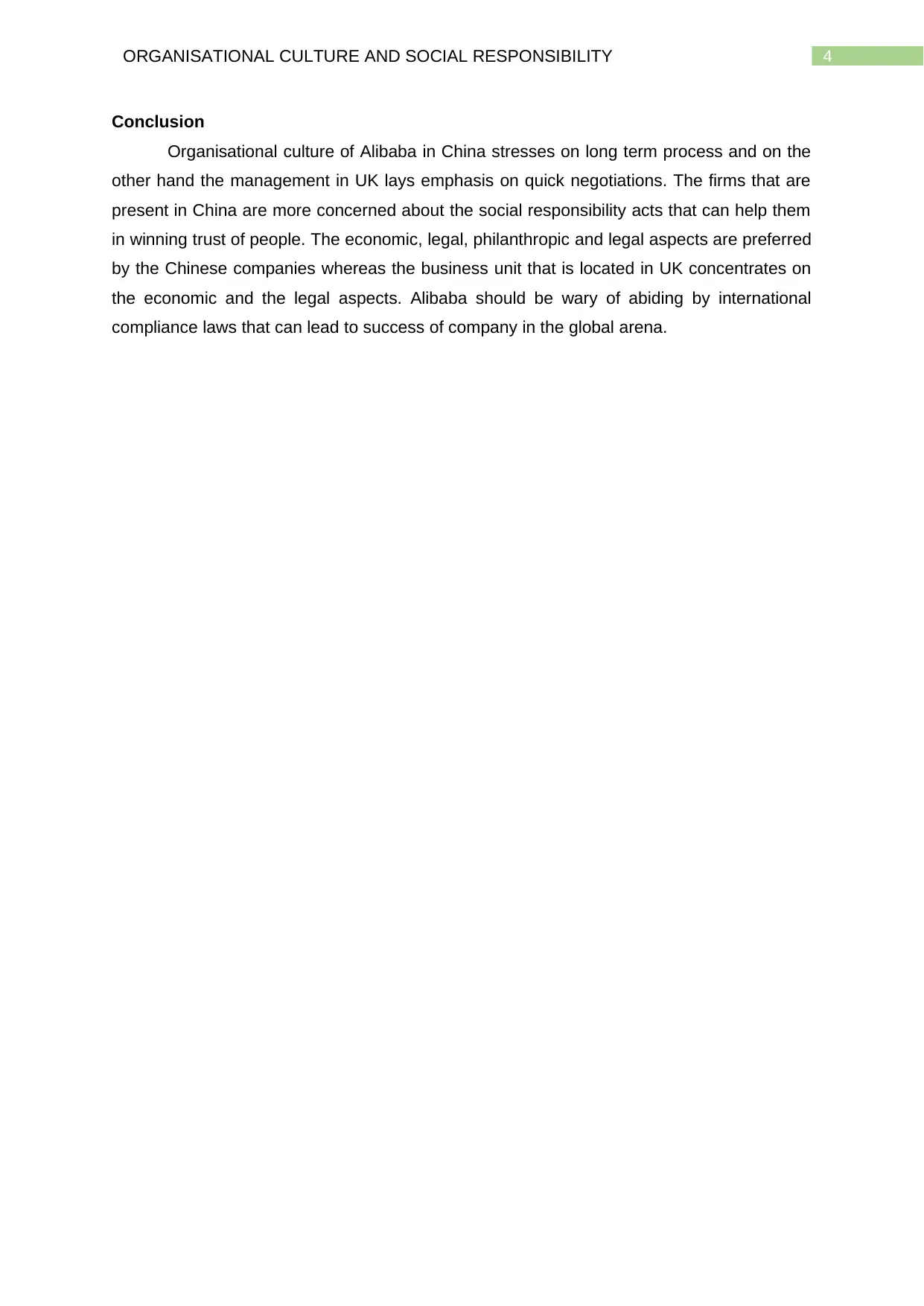
4ORGANISATIONAL CULTURE AND SOCIAL RESPONSIBILITY
Conclusion
Organisational culture of Alibaba in China stresses on long term process and on the
other hand the management in UK lays emphasis on quick negotiations. The firms that are
present in China are more concerned about the social responsibility acts that can help them
in winning trust of people. The economic, legal, philanthropic and legal aspects are preferred
by the Chinese companies whereas the business unit that is located in UK concentrates on
the economic and the legal aspects. Alibaba should be wary of abiding by international
compliance laws that can lead to success of company in the global arena.
Conclusion
Organisational culture of Alibaba in China stresses on long term process and on the
other hand the management in UK lays emphasis on quick negotiations. The firms that are
present in China are more concerned about the social responsibility acts that can help them
in winning trust of people. The economic, legal, philanthropic and legal aspects are preferred
by the Chinese companies whereas the business unit that is located in UK concentrates on
the economic and the legal aspects. Alibaba should be wary of abiding by international
compliance laws that can lead to success of company in the global arena.
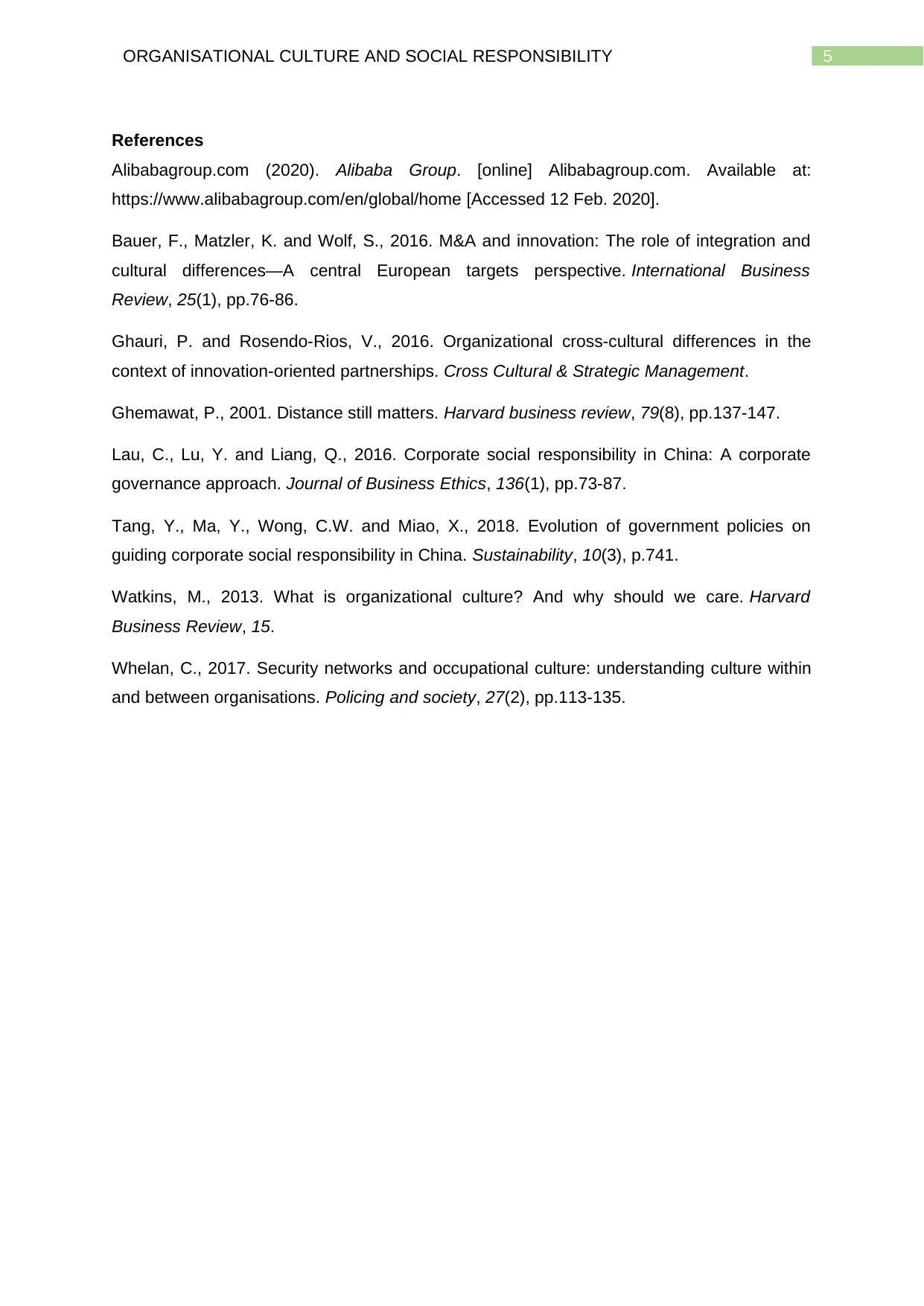
5ORGANISATIONAL CULTURE AND SOCIAL RESPONSIBILITY
References
Alibabagroup.com (2020). Alibaba Group. [online] Alibabagroup.com. Available at:
https://www.alibabagroup.com/en/global/home [Accessed 12 Feb. 2020].
Bauer, F., Matzler, K. and Wolf, S., 2016. M&A and innovation: The role of integration and
cultural differences—A central European targets perspective. International Business
Review, 25(1), pp.76-86.
Ghauri, P. and Rosendo-Rios, V., 2016. Organizational cross-cultural differences in the
context of innovation-oriented partnerships. Cross Cultural & Strategic Management.
Ghemawat, P., 2001. Distance still matters. Harvard business review, 79(8), pp.137-147.
Lau, C., Lu, Y. and Liang, Q., 2016. Corporate social responsibility in China: A corporate
governance approach. Journal of Business Ethics, 136(1), pp.73-87.
Tang, Y., Ma, Y., Wong, C.W. and Miao, X., 2018. Evolution of government policies on
guiding corporate social responsibility in China. Sustainability, 10(3), p.741.
Watkins, M., 2013. What is organizational culture? And why should we care. Harvard
Business Review, 15.
Whelan, C., 2017. Security networks and occupational culture: understanding culture within
and between organisations. Policing and society, 27(2), pp.113-135.
References
Alibabagroup.com (2020). Alibaba Group. [online] Alibabagroup.com. Available at:
https://www.alibabagroup.com/en/global/home [Accessed 12 Feb. 2020].
Bauer, F., Matzler, K. and Wolf, S., 2016. M&A and innovation: The role of integration and
cultural differences—A central European targets perspective. International Business
Review, 25(1), pp.76-86.
Ghauri, P. and Rosendo-Rios, V., 2016. Organizational cross-cultural differences in the
context of innovation-oriented partnerships. Cross Cultural & Strategic Management.
Ghemawat, P., 2001. Distance still matters. Harvard business review, 79(8), pp.137-147.
Lau, C., Lu, Y. and Liang, Q., 2016. Corporate social responsibility in China: A corporate
governance approach. Journal of Business Ethics, 136(1), pp.73-87.
Tang, Y., Ma, Y., Wong, C.W. and Miao, X., 2018. Evolution of government policies on
guiding corporate social responsibility in China. Sustainability, 10(3), p.741.
Watkins, M., 2013. What is organizational culture? And why should we care. Harvard
Business Review, 15.
Whelan, C., 2017. Security networks and occupational culture: understanding culture within
and between organisations. Policing and society, 27(2), pp.113-135.
⊘ This is a preview!⊘
Do you want full access?
Subscribe today to unlock all pages.

Trusted by 1+ million students worldwide
1 out of 6
Related Documents
Your All-in-One AI-Powered Toolkit for Academic Success.
+13062052269
info@desklib.com
Available 24*7 on WhatsApp / Email
![[object Object]](/_next/static/media/star-bottom.7253800d.svg)
Unlock your academic potential
Copyright © 2020–2025 A2Z Services. All Rights Reserved. Developed and managed by ZUCOL.





